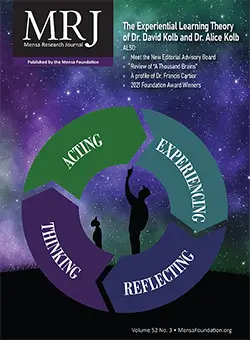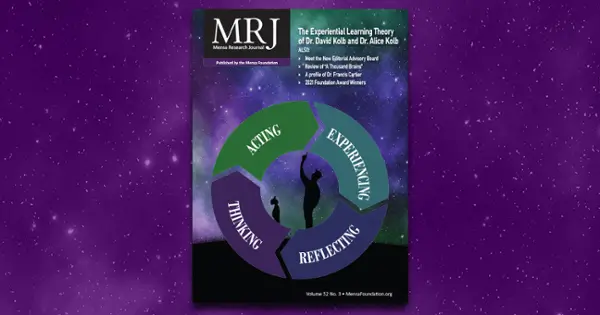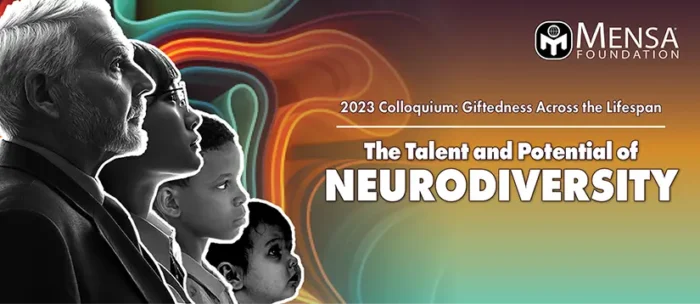
On behalf of the Editorial Board, staff, and contributors to the Mensa Research Journal, I would like to take this opportunity to thank you for your interest in reading and continued sponsorship.
On behalf of the Editorial Board, staff, and contributors to the Mensa Research Journal, I would like to take this opportunity to thank you for your interest in reading and continued sponsorship.
Our Fall 2021 issue of the MRJ begins with background information regarding the MRJ Editorial Advisory Board (EAB) members. Members of the EAB are subject-matter experts who work hard to analyze, review, and produce content for the MRJ and are rarely recognized outside of their listing on our masthead. We would like to take this opportunity to share their backgrounds with you and to recognize their contributions.
Of course, the MRJ would also like to thank Marie Mayer for her dedicated service. Marie recently completed her service on the Mensa Foundation Board of Trustees, where she previously served as Trustee, Vice President, and President. Marie stepped in as Interim Editor of the MRJ and spent two years of dedicated service in that role.
The articles in this issue focus on the experiential learning theories of Dr. David Kolb and Dr. Alice Kolb (i.e the Kolbs). The Experiential Learning Cycle, as described by the authors, is a four-step cycle of learning that applies experiencing, reflecting, thinking, and acting in a recursive loop. In other words, learning is aided when the learner has an actual experience and then reflects upon that experience, thinks about the experience and reflection in an abstract manner to form new or improved concepts, and then takes action to experiment with or confirm these ideas. The process then begins anew with a fresh, concrete experience, and the cycle repeats. This cycle can occur in different ways, depending on the individual learner. This depends to some extent on the preferred learning methods of the student: Imagining, Experiencing, Analyzing, Reflecting, Deciding, Thinking, Initiating, Acting, and Balancing are all possible avenues for learning within this recursive cycle.
We begin with an article from the Kolbs on utilizing experiential learning theory in higher education. This article explains the concept and its application in higher education. The next three articles examine the use of experiential learning theory in different fields: customer journey mapping, science teaching methodology, and entrepreneurial learning from failure. We then conclude with an additional short article by the Kolbs, entitled “Eight Important Things to Know About the Experiential Learning Cycle.” By reading these articles, one can learn the foundational concepts in great detail, learn about their application in various fields, and then refresh with the highlights of the theory in a more condensed format.
For those readers who may wish to learn more about the work of Drs. Kolb and Kolb, they offer video content explaining these concepts in great detail. Another interesting article building on the Kolbs’ work that you may wish to read is “Reverse Bloom: A New Hybrid Approach to Experiential Learning for a New World,” which can be found in the December 2020 issue of the Journal of Education, Innovation, and Communication. You may also enjoy reading “Understanding the Onset of Hot Streaks Across Artistic, Cultural, and Scientific Careers,” which can be found online in the journal Nature Communications.
This issue of the MRJ also includes an in-depth review by our EAB Chair, Dr. Ryan Donlan, of the 2021 book A Thousand Brains: A New Theory of Intelligence. Longtime contributor Dr. Fran Cartier recently retired from contributing his entertaining and informative Notes, Quotes, and Anecdotes column in the MRJ. In this issue, we share a tribute to Dr. Cartier and his many career accomplishments with our appreciation for his longtime service. This issue also includes the latest Mensa Foundation news, as well as the new Random Samples and Standard Deviations column. This new column will pass along interesting information and short references to groundbreaking research.
This is the first issue of the MRJ produced with direction from my new role as Editor-in-Chief, alongside new EAB Chair Ryan Donlan, Ed.D. In preparation for these roles, we spent a great deal of time reviewing past issues, asking questions of professionals who have been involved with the MRJ, observing and discussing the MRJ with Past Interim Editor Marie Mayer, and reviewing past reader input and suggestions. Our goal is to continue to produce an interesting, informative, quality journal, building upon its foundation of thought excellence and continually working to enhance the MRJ with your input.
We invite you to enjoy the Fall 2021 MRJ. Thank you for reading, and please contact us with any feedback or suggestions you may have — including topics that you might find interesting or impactful!
* * *
Published three times yearly, the Mensa Research Journal highlights scholarly articles and recent research related to intelligence from a diverse selection of nationally and internationally esteemed authors. Learn more about the MRJ and subscribe today.
Featured Research
- “Experiential Learning Theory as a Guide for Experiential Educators in Higher Education,” by Alice Y. Kolb and David A. Kolb (Encyclopedia of the Sciences of Learning, 2012 Edition)
- “Customer Journey Mapping as a New Way to Teach Data-Driven Marketing as a Service,” by Andrea Micheaux and Birgit Bosio (Journal of Marketing Education, Vol. 41, Issue 2)
- “The Use of Kolb’s Model in Science Teaching Methodology,” by Snježana Močinić, Nevenka Tatković, and Sanja Tatković (Propósitos y Representaciones, Vol. 8, No. 2)
- “Entrepreneurial Learning From Failure. A Systematic Review,” by Wolfgang Lattacher and Malgorzata Anna Wdowiak (International Journal of Entrepreneurial Behavior & Research, Vol. 26 No. 5)
- “Eight Important Things to Know About the Experiential Learning Cycle,” by Alice Kolb and David Kolb (Australian Educational Leader, Vol. 40, Issue 3)










Comments (0)